Sheela Bhatt in Delhi
Mahendra Kumawat, a 1972 batch Indian Police Service officer, has a lifetime experience of dealing with the Maoists, terrorists and other militancy.
He has contributed in increasing the police and Central Reserve Police Force's operating efficiency in the disturbed areas. He also proposed the establishment of the National Police University, which has been approved by the Union Cabinet.
During his long service in the IPS, he has held many coveted and challenging assignments including Director General, Border Security Force (2008-2009), Special Secretary, Internal Security, Ministry of Home Affairs (2007-2008), Joint Director, Central Bureau of Investigation, Mumbai and New Delhi (1995-2000). Between 1992 and 1994, he made his mark as Ispector General of Police, Special Security Force, in charge of the Greyhounds, the anti-Naxalite commando force based in Andhra Pradesh.
Very few officers have the credentials to discuss internal security issues as much as Kumawat who retired from the IPS last month. He spoke to rediff.com's Sheela Bhatt.
The first of a two-part interview:
It seems that at last the Government of India is waking up to the Maoist threat. The home ministry seems determined to tackle the issue. What's your view of the current situation?
It's really heartening that the government and particularly the home ministry have taken a pro-active stance on Left-wing extremism. They have a long-term and comprehensive approach/plan in dealing with the problem. The Centre will be providing whatever assistance the states need.
But having said so, I am very sceptical abut state governments' preparedness as well as their long-term view and strategy. All the state governments afflicted by Naxal violence are not on the same page. They don't have a consensus on security issues like joint coordinated onslaught or sharing information crucial to launch operations.
What is needed is a uniform policy in all the states.
The top leaders of the country have different views on the problem. Even now, we have failed to have a national consensus on Left-wing extremism. For long West Bengal refused to ban Naxal outfits. Similarly, intellectuals have different views on it. They cannot openly support it, but they try to justify their violence. They are arguing that Left-wing violence is against the State's violence.
Where will we end this cycle of violence, then?
'I have carried so many bodies on my shoulders after landmine blasts'
Image: Police officers at the site of a landmine explosion in Pundgiri, Jharkhand, June 30, 2008.Photographs: Rajesh Kumar Sen/Reuters
The State is democratically and constitutionally elected. The State represents the voice of the people. Any threat to this democratic set-up will have to be tackled by the State.
After all, what do the Naxals want? They want power at the Centre without following Constitutional methods. They want to capture power using the barrel of the gun.
How can any State remain quiet when they are attacking icons of the government? Be it a police station, railway station or power houses.
The State cannot be the mute spectator to their depredations. They attack places vital to the industrial development of this country.
The problem has been there since the last four decades but it has become more serious in the last ten years. Some 20 years back, in Andhra Pradesh, it was very serious. It was as bad as it is now in Chhattisgarh. Public memory is very short.
I have carried so many bodies on my shoulders after landmine blasts. We have learnt many lessons and evolved a strategy. Today, we have overcome the problem in Andhra Pradesh.
But many other states at that time had an ostrich-like policy. We used to have meetings with the neighbouring states. They would invariably say it is not their problem. We knew that the Naxals were spreading their wings in their areas (states neighbouring Andhra Pradesh).
We told the governments that when we put pressure on the Naxals, they take shelter in your area. We told them that when Naxals come to your area, 'please take action against them'. They said that 'Naxals are not committing any crime in our area'.
Now, all these bordering states are facing violence. Unfortunately our predictions have come true. They were not prepared for this kind of violence; their forces are not trained to fight the battle.
'Home ministry has pious plans, where are the matching resources?'
Image: A boy holds a bow and arrow at a relief camp in Dharbaguda, in Chhattisgarh, where violence has mounted since the state government started funding an anti-Maoist movementPhotographs: Kamal Kishore/Reuters
They have formed the COBRA (Commando Battalion for Resolute Action) on the lines of the Greyhounds. It's a mirror image of the guerrilla. It is said that to fight the guerrilla, you have to be a guerrilla!
You will never find a Naxal who is 40/50 years old, they are agile people. In the police force you will find that 50 percent are above 40. How can you fight them?
In Bihar and Jharkhand, there has been no recruitment of policemen in the last 14 years. If there is no recruitment so obviously there is no young blood, who can be lively and fight with energy.
All these states have no training centres to tackle the Naxals. Bihar is almost one-tenth of India but it doesn't have a basic police training centre.
It will take 4, 5 years to set up one. Jharkhand and Bihar are facing huge police administrative problems. The Naxals are taking full advantage of it.
Amongst developing countries our police to people ratio is quite low. We have 140 police to one lakh (100,000) people in most states and even in that there are vacancies. Some years back we had two lakh (200,000) vacancies and it's gone up.
The prime minister himself is writing to chief ministers to fill up the vacancies. Now, something's being done by the states. The home ministry has pious plans, but where are the matching resources with the states in terms of human force, training and equipment?
It is said the home ministry will send the forces. But it is the local police and forces that can deliver because they know the language, culture and terrain. They also know the local problems of the people.
The force that goes from the Centre is almost like an alien force. They are from different parts of the country, so they may not know the language, they may not know the issues and the people's plight. They may not have been briefed in the proper manner. They need training for the purpose. Their training is totally different and their mandate is totally different.
So when central forces go to a Naxal-hit area, they will again require training. Now, only the COBRA is exclusively created to tackle the Naxals. Ten battalions have been sanctioned for the COBRAs. It's a good number if trained properly.
It is the force that can deliver. Three battalions are ready. They have a young profile, best weaponry and motivated people. They know about the problems.
'Let us not have a Somalia or Iraq within our country'
Image: A villager begs a policeman to spare him from being arrested at Pirakata near Lalgarh, West Bengal, June 18, 2009Photographs: Jayanta Shaw/Reuters
The government has made very clear that the air force will not be used. I think the air force should be used for logistic purposes. We should transport our resources and men by helicopters during special operations. It will be a force multiplier.
We should never use the air force in fighting the Naxals. They are not like the army of the enemy. They are guerrillas. They do not put on uniforms and they melt well with the local population.
The collateral damage will be of very high and that must be prevented. Right now, we are not able to win the hearts and minds of the local people.
If even once you kill their children or women or innocent people then the Naxals will say, 'See, how the government is bombing you.'
We will face total elimination. We must avoid it at any cost. Precise information and engaging them on ground will only deliver the results.
Nowhere in the world has bombing been successful in guerrilla warfare.
We can learn form Vietnam, Pakistan, Afghanistan, Somalia and Iraq. Let us not have a Somalia or Iraq within our country.
'Psychological warfare is important'
Image: Paramilitary soldiers run for cover during a gunfight with Maoist rebels in Pirrakuli village near LalgarhPhotographs: Reuters
You are absolutely right. See, it has to be a multi-pronged strategy. Some people are saying we should have a two-pronged strategy of security and development.
While I am saying that, please add to it perception management. Psychological warfare is as important. After all, the Naxals have not given anything to the people in concrete terms.
But by their rhetoric, statements and words they are able to inspire people and win them. Why can't the local government and bureaucrats on the ground speak to people in their own lingo and in their own cultural way and assure them that they will get them development and respect?
Singer-poet Gaddar is able to inspire people in Andhra with his songs. People dance with him and feel that here is the party that can help them.
The states are very slow. They try to save money by not filling vacancies in the police force. Law and order is a state subject. The Centre has limitations and cannot fill up the vacancies.
In some Naxal-affected states like Bihar, some officers are posted in high posts with no past experience of the Naxal issue. How can such officers guide the force?
'Naxalism is now a national problem'
Image: Spent cartridges near Lahiri police station, where policemen were killed in a Maoist attack in Gadchiroli district, in Maharashtra, October 9, 2009Photographs: Reuters
I am not going to say anything on political matters.
What you have said so far also means that there is no end visible to the Naxal problem in the short term?
In the short term, Naxalism won't go. It's a very old issue. But determined national efforts can control the problem. We can defeat the Maoists only by going through a long process where the government creates people's faith in the democratic process and removes the Maoists from the scene. It can be done only if all the states get together.
Even those states where the Maoists are just spreading their tentacles like Punjab, Haryana and some parts of Rajasthan should join in. They will have to be very careful. They should take preventive measures right now if they don't want Naxal violence.
So you say that Naxalism is an essentially a state problem?
It was, but, now it is a national problem. It should be solved in conjunction with the states and the Centre. The Centre should be a facilitator and keep an overview of the problem.
In some states, the Naxals take shelter, in some they indulge in violence, in some they keep weapons and in others their leadership stays and planning takes shape.
No state will have a complete picture of their activities. The Centre will have to act as the brain and capacity builder for the states.
Click on MORE to read Part-II of the interview

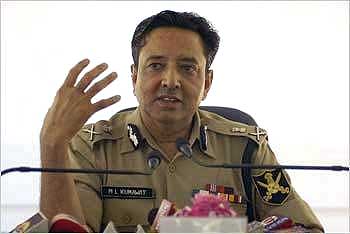
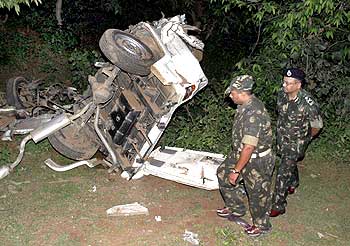

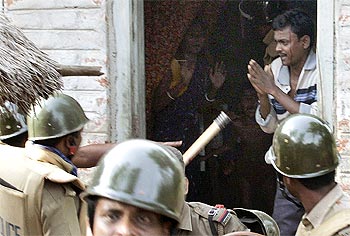
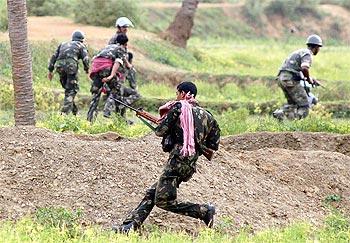
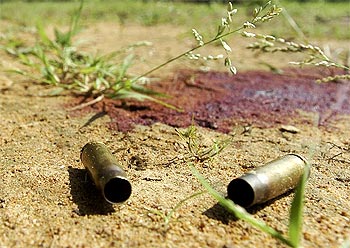
article